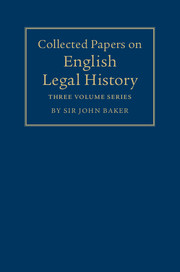Book contents
- Collected Papers on English Legal History: Volume I
- Contents
- List of Illustrations
- Acknowledments
- List of Abbreviations
- Introduction
- PART I The Legal Profession
- PART II The Inns of Court and Chancery
- PART III Legal Education
- PART IV Courts and Jurisdictions
- Collected Papers on English Legal History: Volume II
- Contents
- PART V Legal Literature
- 29 The Three Languages of the Common Law
- 30 Case-Law in Medieval England
- 31 Dr Thomas Fastolf and the History of Law Reporting
- 32 John Bryt's Reports and the Year Books of Henry IV
- 33 Case-Law in England and Continental Europe
- 34 The Books of the Common Law 1400–1557
- 35 English Law Books and Legal Publishing 1557–1695
- 36 Books of Entries
- 37 Manuscripts in the Inner Temple
- 38 Common Lawyers' Libraries 1450–1650
- 39 John Rastell and the Terms of the Law
- 40 Coke's Notebooks and the Sources of his Reports
- 41 John Selden and English Legal History
- 42 The Newe Littleton
- 43 Sir Thomas Robinson's Notebooks
- PART VI Legal Antiquities
- PART VII Public Law and Individual Status
- PART VIII Criminal Justice
- Collected Papers on English Legal History: Volume III
- Contents
- PART IX Private Law
- PART X General
- Bibliography of the Published Works of Sir John Baker
- Index
41 - John Selden and English Legal History
from PART V - Legal Literature
Published online by Cambridge University Press: 05 December 2014
- Collected Papers on English Legal History: Volume I
- Contents
- List of Illustrations
- Acknowledments
- List of Abbreviations
- Introduction
- PART I The Legal Profession
- PART II The Inns of Court and Chancery
- PART III Legal Education
- PART IV Courts and Jurisdictions
- Collected Papers on English Legal History: Volume II
- Contents
- PART V Legal Literature
- 29 The Three Languages of the Common Law
- 30 Case-Law in Medieval England
- 31 Dr Thomas Fastolf and the History of Law Reporting
- 32 John Bryt's Reports and the Year Books of Henry IV
- 33 Case-Law in England and Continental Europe
- 34 The Books of the Common Law 1400–1557
- 35 English Law Books and Legal Publishing 1557–1695
- 36 Books of Entries
- 37 Manuscripts in the Inner Temple
- 38 Common Lawyers' Libraries 1450–1650
- 39 John Rastell and the Terms of the Law
- 40 Coke's Notebooks and the Sources of his Reports
- 41 John Selden and English Legal History
- 42 The Newe Littleton
- 43 Sir Thomas Robinson's Notebooks
- PART VI Legal Antiquities
- PART VII Public Law and Individual Status
- PART VIII Criminal Justice
- Collected Papers on English Legal History: Volume III
- Contents
- PART IX Private Law
- PART X General
- Bibliography of the Published Works of Sir John Baker
- Index
Summary
It is only to be expected that the literary director of the Selden Society, who also happens to be a student and collector of manuscripts, a bencher of the Inner Temple, and an opponent of current constitutional slippages, should feel a distinct affinity with John Selden. What is more, although he was (in his own words) bred from the bottom of obscurity, Selden claimed to be descended through his mother from the first Sir John Baker, another bencher of the Inner Temple, whose unusual year book of Edward II – then in the Inner Temple library – he discussed in his notes to Fleta.
Selden is well known to legal historians in general from the society named after him. The truth is, however, that his name is now more widely known by reason of this association than from direct contact with his works; and so it is perhaps worth reflecting on how we should place him in the history of the discipline. Since Maitland is generally regarded as one of the prime movers behind the Selden Society, it is often assumed that he suggested the name, which would be a sufficient accolade in itself; yet Selden was not in fact his own first choice. Maitland's preference for Madox puts us on guard against assuming that the matter is obvious, especially since Selden's work is now so unfamiliar to most of us.
Selden began a legal career in the usual way.
- Type
- Chapter
- Information
- Collected Papers on English Legal History , pp. 765 - 777Publisher: Cambridge University PressPrint publication year: 2013
- 1
- Cited by



